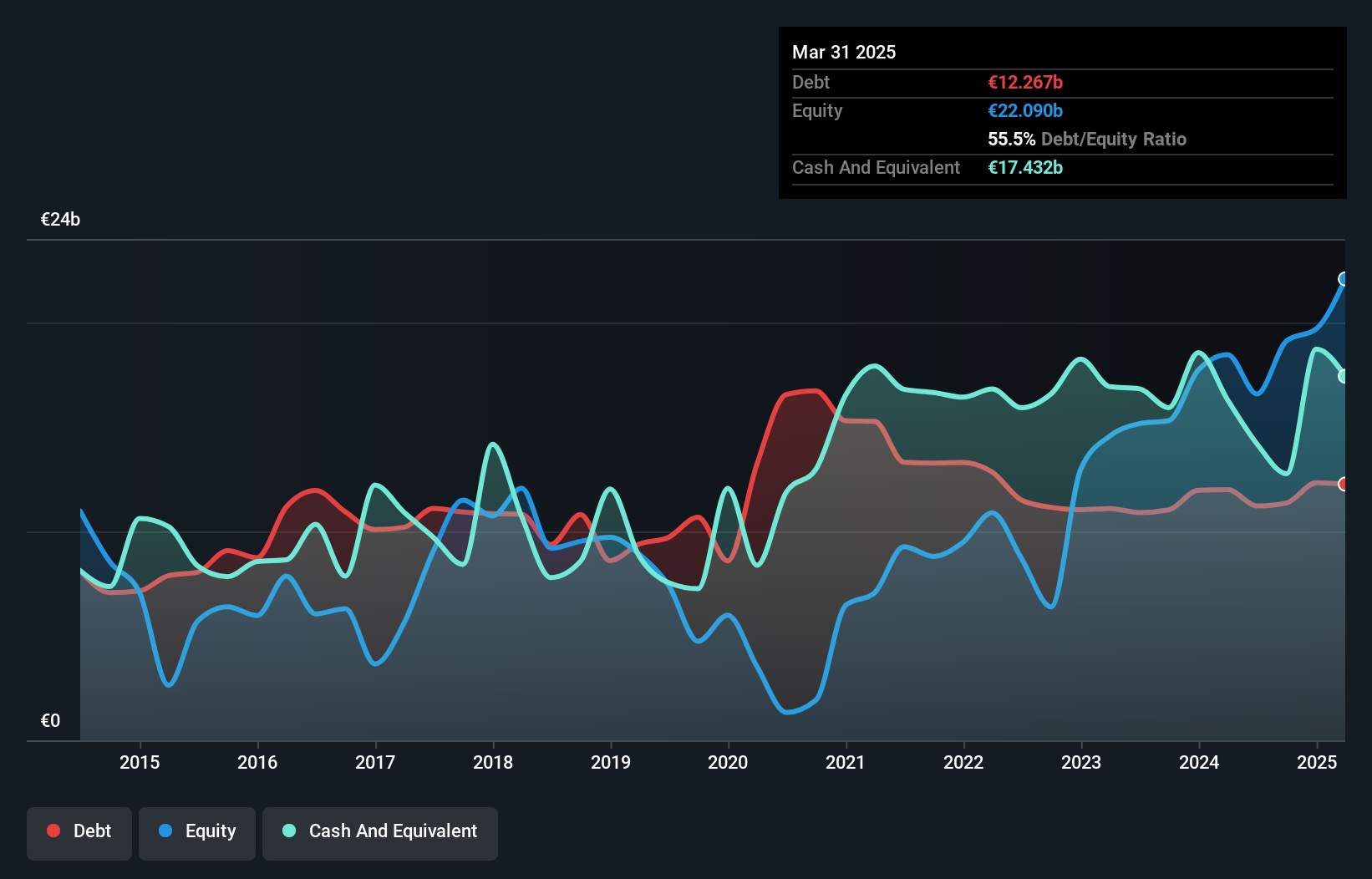Legendary fund manager Li Lu (who Charlie Munger backed) once said, 'The biggest investment risk is not the volatility of prices, but whether you will suffer a permanent loss of capital.' It's only natural to consider a company's balance sheet when you examine how risky it is, since debt is often involved when a business collapses. We note that Airbus SE (EPA:AIR) does have debt on its balance sheet. But the real question is whether this debt is making the company risky.
What Risk Does Debt Bring?
Debt is a tool to help businesses grow, but if a business is incapable of paying off its lenders, then it exists at their mercy. If things get really bad, the lenders can take control of the business. However, a more common (but still painful) scenario is that it has to raise new equity capital at a low price, thus permanently diluting shareholders. By replacing dilution, though, debt can be an extremely good tool for businesses that need capital to invest in growth at high rates of return. The first step when considering a company's debt levels is to consider its cash and debt together.
What Is Airbus's Net Debt?
The chart below, which you can click on for greater detail, shows that Airbus had €12.3b in debt in March 2025; about the same as the year before. But it also has €17.4b in cash to offset that, meaning it has €5.17b net cash.

A Look At Airbus' Liabilities
According to the last reported balance sheet, Airbus had liabilities of €61.5b due within 12 months, and liabilities of €48.8b due beyond 12 months. On the other hand, it had cash of €17.4b and €10.1b worth of receivables due within a year. So its liabilities outweigh the sum of its cash and (near-term) receivables by €82.7b.
This deficit is considerable relative to its very significant market capitalization of €128.3b, so it does suggest shareholders should keep an eye on Airbus' use of debt. Should its lenders demand that it shore up the balance sheet, shareholders would likely face severe dilution. Despite its noteworthy liabilities, Airbus boasts net cash, so it's fair to say it does not have a heavy debt load!
Check out our latest analysis for Airbus
The good news is that Airbus has increased its EBIT by 9.5% over twelve months, which should ease any concerns about debt repayment. When analysing debt levels, the balance sheet is the obvious place to start. But ultimately the future profitability of the business will decide if Airbus can strengthen its balance sheet over time. So if you're focused on the future you can check out this free report showing analyst profit forecasts.
Finally, while the tax-man may adore accounting profits, lenders only accept cold hard cash. Airbus may have net cash on the balance sheet, but it is still interesting to look at how well the business converts its earnings before interest and tax (EBIT) to free cash flow, because that will influence both its need for, and its capacity to manage debt. Over the most recent three years, Airbus recorded free cash flow worth 76% of its EBIT, which is around normal, given free cash flow excludes interest and tax. This cold hard cash means it can reduce its debt when it wants to.
Summing Up
Although Airbus's balance sheet isn't particularly strong, due to the total liabilities, it is clearly positive to see that it has net cash of €5.17b. And it impressed us with free cash flow of €5.3b, being 76% of its EBIT. So we don't have any problem with Airbus's use of debt. Over time, share prices tend to follow earnings per share, so if you're interested in Airbus, you may well want to click here to check an interactive graph of its earnings per share history.
If, after all that, you're more interested in a fast growing company with a rock-solid balance sheet, then check out our list of net cash growth stocks without delay.
New: Manage All Your Stock Portfolios in One Place
We've created the ultimate portfolio companion for stock investors, and it's free.
• Connect an unlimited number of Portfolios and see your total in one currency
• Be alerted to new Warning Signs or Risks via email or mobile
• Track the Fair Value of your stocks
Have feedback on this article? Concerned about the content? Get in touch with us directly. Alternatively, email editorial-team (at) simplywallst.com.
This article by Simply Wall St is general in nature. We provide commentary based on historical data and analyst forecasts only using an unbiased methodology and our articles are not intended to be financial advice. It does not constitute a recommendation to buy or sell any stock, and does not take account of your objectives, or your financial situation. We aim to bring you long-term focused analysis driven by fundamental data. Note that our analysis may not factor in the latest price-sensitive company announcements or qualitative material. Simply Wall St has no position in any stocks mentioned.
About ENXTPA:AIR
Airbus
Engages in the design, manufacture, and delivery of aeronautics and aerospace products, services, and solutions worldwide.
Outstanding track record with flawless balance sheet.
Similar Companies
Market Insights
Community Narratives




